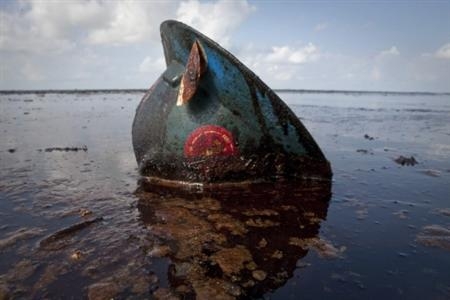Article re-posted from Miami Herald November 18, 2014 (article by: Jenny Staletovich) – Please click HERE for original article.
Above: hard hat found at the BP Oil Spill in Louisiana – Photo credit: Reuters.
Two South Florida universities recently received a huge amount of $37.5 million to do extensive research on the environmental impact of the 2011 Deepwater Horizon oil spill.
This event heavily affected the Gulf of Mexico as it spewed 250 million gallons of crude oil into the sea, killing 11 workers, and created such environmental havoc that, to this day, remains a huge concern for scientists and environmentalists.
The two universities which will get the research awards are the University of Miami Rosenstiel School of Marine and Atmospheric Science receiving $29 million, and the Nova Southeastern University with $8.5 million. These are the commitments given by BP, the company responsible for the oil spill. This is part of a $500 million independent research program, spread over 10 years, which started a month after the oil spill happened.
Just last week, the Gulf of Mexico Research Initiative, through its 20-member board, provided an initial fund of $140 million to 12 research teams, one of which was coming from the University of Florida.
“This is not just an academic thing,” said UM engineer Tamay Özgökmen. “We are trying to bridge science and academia with application.” Özgökmen is one member of a 40-man team of scientists who won $20 million to study how oil spreads dangerously across the ocean.
As a consequence of the spill, oil damaged the hearts of tuna and affected heavily the swimming patterns and behaviour of mahi-mahi, as pointed out in a study earlier published this year by UM marine biologist Martin Grosell. Supported by this research, he received another $9 million from BP.
Since 2011, after the worst oil spill in U.S. history, BP has been in a financial battleground. The oil spill has been tremendously affecting the business of the beleaguered company.
It has spent $24 billion for the cost of cleaning the waters and shorelines and paid heavily on crude oil damage not only to the environment but also to the huge economic drawback on nearby fishing tours and hotels.
In January 2013, after pleading guilty of manslaughter, it also compensated the workers who died. It amounted to a $4 billion payment, a negotiation undertaken through the Justice Department.
The company also suffered a major loss when a federal judge decided that the company acted recklessly by violating the Clean Water Act, compounding its financial woes to another hefty $18 billion.
The research program, offered to mitigate the effects of the Deepwater Horizon oil spill in the Gulf of Mexico, is one of the multi-faceted approaches of BP to settle its legal suits and rectify its image after suffering from huge economic and media losses.






